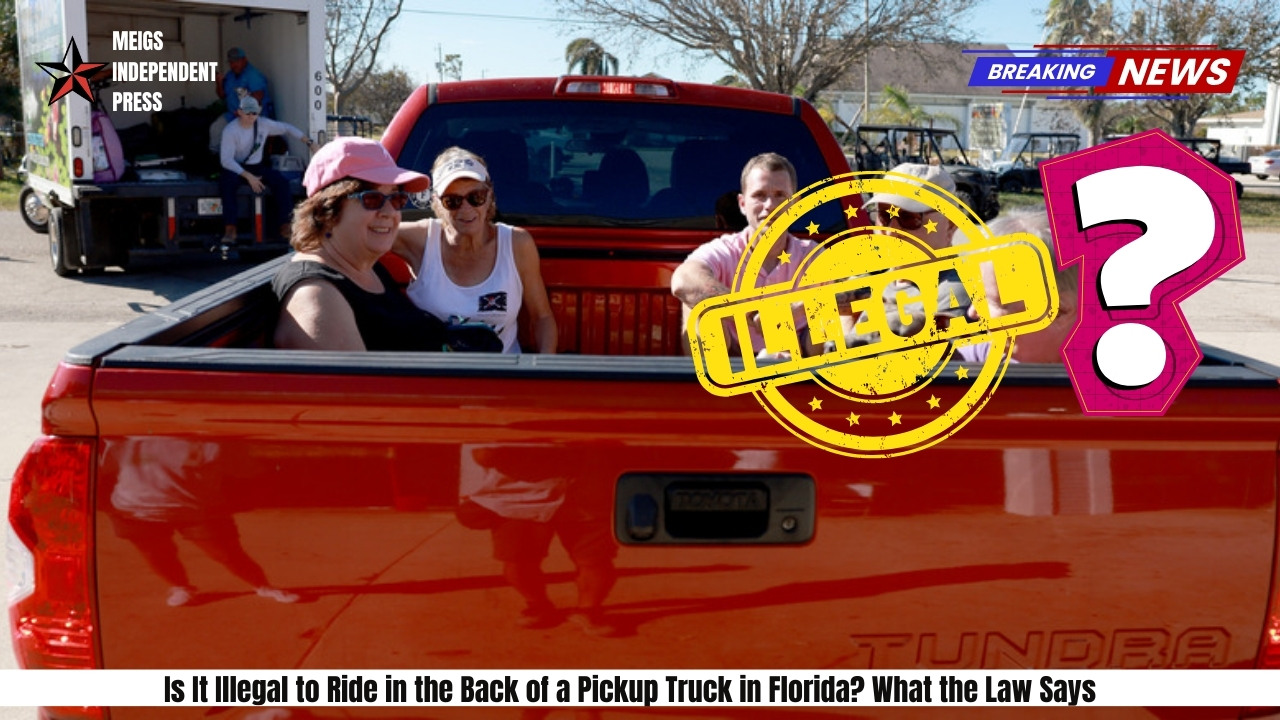The sun on your face, the wind in your hair—for many, the image of riding in the open bed of a pickup truck is a classic slice of Americana. It evokes feelings of freedom, adventure, and simpler times. Whether it was helping a friend move across town, heading home from a long day at the beach, or just enjoying a warm summer evening, it’s a memory many people share. But as the world has become more safety-conscious, a crucial question arises, especially in a state known for its sunshine and open roads: Is it actually legal to ride in the back of a pickup truck in Florida?
The nostalgic image often clashes with the harsh reality of modern traffic laws and safety standards. What might have been common practice a generation ago is now viewed through a different lens. The answer isn’t a simple yes or no. It’s a nuanced issue governed by specific state statutes, exceptions, and a heavy dose of common sense. This article will break down everything you need to know about Florida’s laws on passengers in truck beds, the serious dangers involved, and why safety should always be your top priority.
The Straight Answer: Florida’s Pickup Truck Bed Law
Let’s cut right to the chase. In the state of Florida, it is generally illegal for a person to ride in the bed of a pickup truck. This rule is outlined in Florida Statute 316.2015, which addresses “unlawful riding on vehicles.” However, the law provides a very specific and critical carve-out based on age.
The core of the law states that a truck operator cannot allow a person under 18 years of age to ride in the open bed of the truck.
This means if you are 18 years or older, the statute does not explicitly prohibit you from riding in the back of a pickup truck on a Florida roadway. For minors, however, the practice is strictly forbidden under most circumstances. The law is designed to protect the state’s most vulnerable passengers, recognizing that children and teenagers are particularly susceptible to severe injury in the event of an accident.
Crucial Exceptions to the Rule
While the law is clear about protecting minors, it also recognizes that there are certain situations where riding in a truck bed is necessary or customary. The Florida legislature wrote several key exceptions directly into the statute, which apply specifically to the prohibition against minors riding in the back. It is legal for a person under 18 to ride in the truck bed if:
- The truck bed is equipped with and the minor is using a safety belt. This is an extremely rare scenario, as very few pickup trucks are manufactured with factory-installed, safety-rated seating and restraints in the cargo bed. Aftermarket installations would need to meet federal motor vehicle safety standards, which can be a complex and expensive undertaking.
- The minor is riding in a truck bed that is enclosed by a secure camper top or other similar enclosure. The key terms here are “enclosed” and “secure.” A simple, loosely fitted tonneau cover would not suffice. The enclosure must be substantial enough to prevent a person from being ejected in a crash.
- The situation is an emergency. The law allows for flexibility in true life-or-death emergency situations, though what constitutes a legal “emergency” can be subjective and may need to be proven in court.
- The vehicle is part of an official parade or procession. Minors can legally ride in the back of a pickup during a sanctioned parade, provided the vehicle is traveling at a very low speed (the statute specifies no more than 8 miles per hour).
- The transportation is for agricultural work. This is a significant exception in a major agricultural state like Florida. The law permits minors who are engaged in farm work to be transported in the back of a truck, but only for the purpose of that work.
It’s important to remember that these exceptions apply only to the law concerning minors. For adults over 18, the act of riding in the bed isn’t explicitly illegal, but as we’ll see, that doesn’t mean it’s safe or a good idea.
The ‘Why’ Behind the Law: Understanding the Dangers
Florida’s law isn’t arbitrary; it’s rooted in overwhelming evidence of extreme danger. A pickup truck’s cargo bed is engineered to haul equipment, gravel, and furniture—not people. It lacks every single safety feature that has become standard in the passenger cabin of a modern vehicle.
No Restraints, No Protection
The single greatest danger is the risk of ejection. In the event of a sudden swerve, a sharp turn, or a collision, a person in the back of a truck can easily be thrown onto the pavement or into the path of another vehicle. According to traffic safety experts, passengers who are ejected from a vehicle are multiple times more likely to suffer a fatal injury. Without seatbelts to hold them in place, passengers in the bed are completely unrestrained.
Zero Safety Features
Consider what happens inside a car during a crash. The vehicle’s frame is designed with crumple zones to absorb impact. Airbags deploy in milliseconds to cushion passengers. The roof and pillars are reinforced to prevent collapse in a rollover. A passenger in the truck bed has none of these protections. They are exposed not only to the risk of ejection but also to direct impact from other vehicles and debris. There is no steel cage, no airbag, and no headrest to prevent catastrophic head and spinal injuries.
Exposure to the Elements
Beyond crash-related risks, there are other dangers. A sudden stop can send a passenger slamming into the hard steel walls of the truck bed. Road debris, like rocks or tire fragments kicked up by other cars, can become dangerous projectiles. Furthermore, passengers are exposed to carbon monoxide from the truck’s exhaust, which can accumulate in the turbulent air pocket of the truck bed and lead to dizziness, nausea, or even poisoning on longer rides.
Potential Consequences: More Than Just a Ticket
For drivers who violate the law and allow a minor to ride illegally in their truck bed, the consequences can be significant and multifaceted.
Legal and Financial Penalties
The immediate consequence is a traffic citation. A violation of Florida Statute 316.2015 is a moving violation, which means the driver will not only have to pay a fine but will also have points assessed against their driver’s license. Accumulating too many points can lead to increased insurance premiums and, eventually, a license suspension.
Civil Liability and Insurance Nightmares
The traffic ticket may be the least of a driver’s worries. If an accident occurs and a passenger in the truck bed is injured—especially a minor who was there illegally—the driver could face a devastating personal injury lawsuit. The fact that the driver knowingly violated a safety statute can be used as powerful evidence of negligence.
Furthermore, auto insurance policies may not cover the incident. Insurance companies often include clauses that can limit or deny coverage for injuries sustained while engaging in an illegal act. A driver could find themselves personally responsible for exorbitant medical bills, long-term care costs, and damages for pain and suffering, potentially leading to financial ruin. This applies even if the passenger is an adult. While it may be legal for an adult to ride in the back, an insurance company may argue that the driver acted negligently by allowing them to do so, creating a complex legal battle.
Safety First: The Only Smart Alternative
Given the clear laws for minors and the overwhelming safety risks for everyone, the conclusion is simple: no one should ride in the open bed of a moving pickup truck. The convenience or momentary fun is not worth the risk of a life-altering injury or death.
The only safe place for a passenger is inside the cab of the truck, properly secured with a seatbelt. If you have more passengers than you have seatbelts, the answer is not to put them in the back. The answer is to take another vehicle or make a second trip. This simple decision is the most important one a driver can make. Insist that every passenger has a designated seat and buckle up, every single time.
Final Thoughts
The carefree image of riding in a truck bed belongs in the past. In today’s world of faster speeds, more congested roads, and a deeper understanding of vehicle dynamics and crash physics, the practice is unacceptably dangerous. Florida law reflects this reality by specifically prohibiting the transport of minors in this manner, and the principles of safety should extend that caution to passengers of all ages.
Don’t let a moment of nostalgia lead to a lifetime of regret. The law is clear, the dangers are real, and the consequences can be devastating. The next time you’re loading up the truck, make sure your precious cargo—the people you care about—is safely secured inside the cab. It’s the right thing to do, it’s the safe thing to do, and for anyone under 18, it’s the law.








Leave a Reply